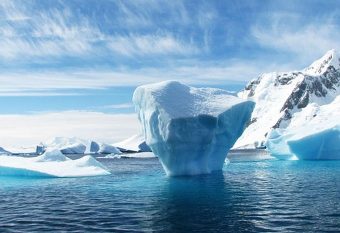
Two of Antarctica’s glaciers are holding our civilization hostage, meteorologist Eric Holthaus wrote in a piece for Grist. Pine Island and Thwaites are among the continent’s biggest and fastest-melting glaciers – and they could unleash 11 feet of sea level rise if they collapse. That’s enough to flood every coastal city on our planet.
Thwaites and Pine Island sprawl across a plain over 150-miles-long, and inland widen to a reserve of ice two-miles-thick that’s about the size of Texas, according to Holthaus, who says there’s no doubt the ice will melt. The question is not if, but how soon. Should the two glaciers collapse, every shoreline and coastal city could be inundated with water, leaving hundreds of millions of climate refugees homeless. And those events could happen in 20 to 50 years – too fast for humans to adapt.
Two climatologists, in a study published in Nature last year, said an increase of six feet in ocean levels by 2100 was more likely than three feet – but if carbon emissions continue increasing in a worst case scenario, all 11 feet of ice held back in Antarctica could be freed.
But if these glaciers are miles thick, wouldn’t it take an incredibly long time for them to collapse? That may not be the case in our warming world. Holthaus pointed to new evidence saying once we reach a certain temperature threshold, glacier ice shelves extending into the sea – like those of Thwaites and Pine Island – could melt from below and above, quickening their demise.
Holthaus noted not every scientist thinks there’s cause for panic. National Snow and Ice Data Center lead scientist Ted Scambos said the two glaciers may not collapse all at once – and rapid collapse would still produce several icebergs that could slow the rate of retreat and act as a temporary ice shelf. But the scientific community is starting to think we need more research into the risk of rapid sea level rise, according to Holthaus.
University of Michigan leading ice sheet scientist Jeremy Bassis said, “Every revision to our understanding has said that ice sheets can change faster than we thought. We didn’t predict that Pine Island was going to retreat, we didn’t predict that Larsen B was going to disintegrate. We tend to look at these things after they’ve happened.”
Source: inhabitat.com

